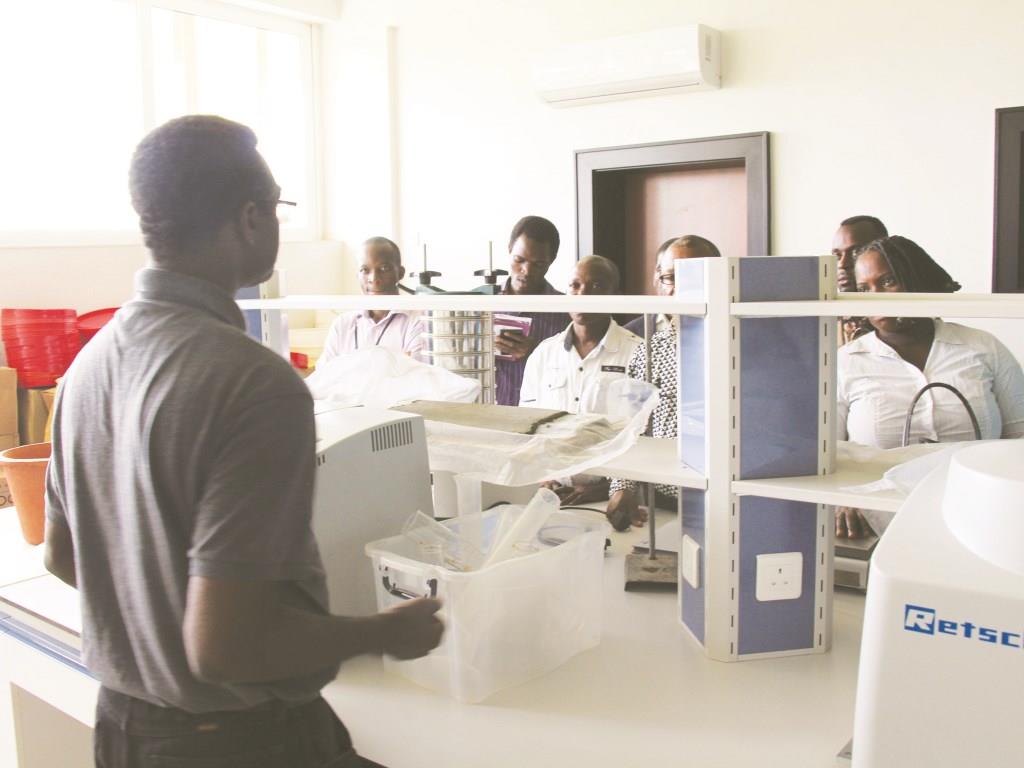The visit to the National Universities Commission (NUC) was followed by another to the African University of Science and Technology’s Pan-African Materials Institute (PAMI), to interact with the Centre Leaders of the 10 Africa Centres of Excellence (ACEs) in Nigeria.
Welcoming the delegation, which also included members of the ACE Secretariat, the President of AUST, Professor Kingston Nyamapfene, expressed appreciation to the PAMI team as well as the Vice-Chancellor and representatives of the other ACEs, for their commitment to the success of the Project.
In his remarks, Project Coordinator, ACE Nigeria, Dr. Joshua Atah, gave a brief background of the Project, stating its objectives and how the 10 Centres in Nigeria emerged. He also introduced each ACE and how their individual research projects were contributing to national development.
Briefing the gathering on the activities of the University of Port Harcourt’s Centre for Oil Field Chemicals (CEFOR), Centre Leader, Professor Ogbonna Joel, highlighted the Centre’s mandate of developing machinery and expertise for locally-sourced oilfield chemicals that would positively affect profit margin and create jobs, for national development. As one of the requirements to meet their Disbursement-Linked Indicators (DLIs), CEFOR was collaborating with a number of industries and this had afforded students of the Centre the opportunity to carry out research on real life issues.
Professor Joel stated that the Centre currently had a total of 429 students, comprising 25 PhD students, 270 Masters and short course. It had, so far, graduated 7 PhD and 209 Master’s students. It also had six regional students enrolled for Masters and 28 for short courses. Professor Joel highlighted some of the Centre’s challenges to include attracting regional students as a result of funding constraints as well as the perceived insecurity in the country.
Centre Leader of Benue State University’s Centre for Food Technology and Research (CEFTER), Professor Daniel Adedzwa, expressed satisfaction with the effectiveness of the results-based financing model adopted for the ACE project. He stated that CEFTER had a total enrolment of 300 postgraduate, including PhD and Masters, and would be graduating the first set of students by the end of 2017. So far, students of the Centre have been able to develop 71 locally-processed food products and are working with the Benue State Government to promote the processing of food for export.
Though CEFTER had initially experienced teething problems, associated with the slow release of funds, the issue had been addressed, Professor Adedzwa said. He expressed optimism that the Federal Ministry of Education’s proposed adoption of the results-based financing nature in Nigerian universities would lead to transparency in funds utilization in the nation’s institutions and enable funding partners to develop more interest in donating to the development of education in higher institutions.
A highlight of the visit was the interaction with some students of PAMI, who expressed delight and gratitude for the opportunities availed them by the ACE Project.
In his response, Dr. Chanduvi expressed appreciation and pleasure at the progress recorded by the Project in Nigeria. He stated that the World Bank had set out to support universities in improving the quality of teaching and research as well as providing opportunities to students to develop their skills in the area of science and technology. He urged the ACEs to intensify efforts at linking the universities with industries, as end users of the research process, to ensure that research efforts achieved the desired objective of developing best technologies for various sectors.
Dr. Chanduvi encouraged the students to ensure that skills and knowledge acquired through the ACE project were channeled toward the development of, not only their immediate environment but, Africa, as a whole. He conveyed the World Bank’s commitment to steering the Centres towards achieving the desired Project objectives.
Other ACEs present at the interaction were Ahmadu Bello University (ABU), Zaria’s Africa Centre of Excellence in Neglected Tropical Diseases and Forensic Biotechnology (ACENTDFB), University of Jos’s ACE in Phytomedicine Research and Development (ACEPRD) and Federal University of Agriculture, Abeokuta’s Centre for Agriculture Development and Sustainable Environment (CEADESE).

